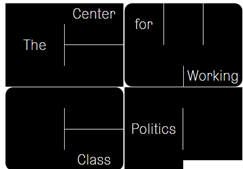While Donald Trump is not a politician known for his message discipline, he took the world by storm in 2016 with a well-articulated diagnosis of what ailed the nation. “Make America Great Again” managed in four words to assert that America had been great, that it no longer was, and that he would do something about it.
His current campaign, by contrast, has devolved into the litigation of personal vendettas, crass promotion of niche issues like cryptocurrency, and pandering to the donor class on tax cuts and temporary labor.
The rallying cry to “Make America Great Again” has become the personal brand of “MAGA,” and these are not the same thing at all.
ONE THING TO READ THIS WEEK
Your one thing to read this week is “Why Do So Many Workers Love Trump?” Yes, that’s right, we’re starting with a piece in Jacobin, from Center for Working-Class Politics director Jared Abbott.
Abbott goes back to 2016 to remind readers of the original Trump campaign’s intensive focus on economic issues. “If we look at the content of Trump’s appeals to working-class voters,” he writes:
we see that a narrow focus on the darkest aspects of Trump’s rhetoric belies consistent and often quite powerful appeals that tap directly into decades of economic dislocation experienced by millions of American workers. … Trump used pro-worker rhetoric nearly three times as often— and anti–economic elite rhetoric more than twice as often—as he brought up controversial social issues.
When Trump focused on immigration, “his remarks framed immigration in terms of protecting American workers, not in overtly bigoted terms based on the condemnation of an entire class of people.”
Ironically, in a darkly tragic sort of way, Trump the iconoclast was eager to make his economic case at a time when it was novel and, as a result, had little institutional or intellectual foundation. Nearly a decade later, a robust set of arguments, attacks, critiques, examples, and policies is available. His selection of Senator JD Vance, a leader on many of those fronts, as his running mate suggests Trump is at least aware of their existence. But a coterie of Old Right consultants and donors who wanted nothing to do with him in 2016—leaving him to his much better instincts—has taken the reins and seems determined to steer the campaign into a ditch.
It doesn’t fit on a bumpersticker, but time is running out to Make Make America Great Again Great Again.
BONUS LINK: One of the best things written about the 2016 Trump campaign was by Mike Konczal, then a fellow at the Roosevelt Institute, now a special assistant to President Joe Biden for economic policy: Trump Is Actually Full of Policy. Policy wonks write whitepapers, Konczal argued, but in politics, the “policy” that voters care about is your description of the problems that they want solved. This was where Trump excelled.
BONUS LOGO: Apropos of nothing, I was curious about this Center for Working-Class Politics and so went searching for their website. If nothing else, they surely have the distinction of world’s worst logo:
THIS WEEK AT AMERICAN COMPASS
The Compass Point is from national security lawyer Adam Chan, on the case for taxing capital gains in China as an alternative to banning outbound investment altogether: Paying the Price for Investing in China.
Allowing investment in an adversary’s military-industrial base and technological prowess is bad enough. Subsidizing it is madness. So long as an outright ban on such “outbound investment” remains stalled, Congress should use the tax code to achieve a similar outcome. Specifically, Congress should raise taxes on capital gains and dividends from investment in China to at least the highest rate paid on ordinary income.
Also on The Commons:
It’s Time for a Bonus, Baby: Patrick T. Brown of the Ethics & Public Policy Center urges the Trump-Vance campaign to propose a straightforward baby bonus for new parents.
Conservatives Need a Positive Governing Vision: Aaron Renn laments that the GOP still clings to its identify as the Party of No.
Does Trade Policy Affect Trade?: Yours truly deconstructs the argument from free traders that a nation’s “savings” and “investment” decisions, unrelated to trade policy, dictate trade balances.
And, on the American Compass Podcast this week, Aaron Renn does double duty, joining me to discuss regional economics and the opportunities for conservatives to develop an urban agenda.
WHAT ELSE SHOULD YOU BE READING?
Re: Knowing When to Fold’em… David Wallace-Wells writes We All Live in Vegas Now
It’s heartening to see increasing scrutiny of the disaster that is our pro-gambling culture. Wallace-Wells does a nice job here, jumping off from Nate Silver’s new book, On the Edge: The Art of Risking Everything. He makes three important points in particular: first, that the abandonment of morals legislation, whether on drugs or gambling, is not going well; second, that with gambling in particular, clear evidence is already emerging of catastrophic financial harm to vulnerable users; and, third, casino and sports gambling is in many respects just one dimension of a larger transformation in many facets of our economy.
And as long as I’ve already featured Aaron Renn on The Commons and the American Compass Podcast above, may as well also note that he just wrote a good piece on this for his own Substack: Sports Betting and Meme Stocks.
Re: Conservative Cliff Notes… Julius Krein reviews recent political philosophy for American Affairs in Statesmanship and Political Philosophy
Julius reads recent works of political philosophy so you don’t have to, trenchantly summarizing and critiquing them as he goes. Also highlighted here as an excuse to note that he has previously published at American Affairs the best review essays ever written—Matthew Walther’s Principles for Dummies (on Ray Dalio’s book, Principles) and Trivial Pursuit (on Arthur Brooks’s documentary, The Pursuit). Don’t miss them.
Re: A Home for the Tech Bros… Sam Hammond writes in City Journal on A Rising Counter-Elite
A couple of weeks ago, I discussed the tension between two camps in the New Right coalition: working-class conservatives and Silicon Valley techno-libertarians. Here, Sam Hammond makes the case for the coalition’s coherence.
Re: My Kind of Click Bait… the Wall Street Journal reports, Coming to a Cash-Strapped Company Near You: Creditor-on-Creditor Violence
Of course I was clicking on that headline, and you should too—partly for the absurdity, partly for lines like “Many of the companies involved have taken on loans and bonds to pay for their acquisitions by private-equity funds.” Good luck diagramming that sentence. Wait, who took on the loan? The company? To buy what? Itself? No, it took on the loan so someone else could buy it? (Yes, I know that’s how leveraged buyouts in fact work. No, that doesn’t make it less ridiculous.)
Re: Daddy Warbucks… the Financial Times reports, Top Defence Contractors Set to Rake in Record Case After Orders Soar
The United States has traditionally imposed a war-profiteering tax in times of conflict, and the idea is coming up again in a surprising range of contexts across the political spectrum. For instance, you’d be amazed how quicky the liberal enthusiasm for funding the war in Ukraine dissipates among the corporate elite upon suggestion that a corporate tax surcharge might raise the needed revenue. Even beyond the need to replenish armaments in hot wars, it is becoming increasingly clear that enormous investment in the American defense-industrial base will be necessary to reverse the erosion of recent decades. Producers in the sector of course deserve to earn a reasonable return on capital for participating in such a build-up. But will there be limits, and how would they be defined and enforced? Bears watching.
Enjoy the long weekend!






I have come to truly appreciate your posts. I reliably find the principled moral stance in your posts and the roundup of exceptional links. Thank you.
Nice comments. Cass is always intelligent, unusually articulate.